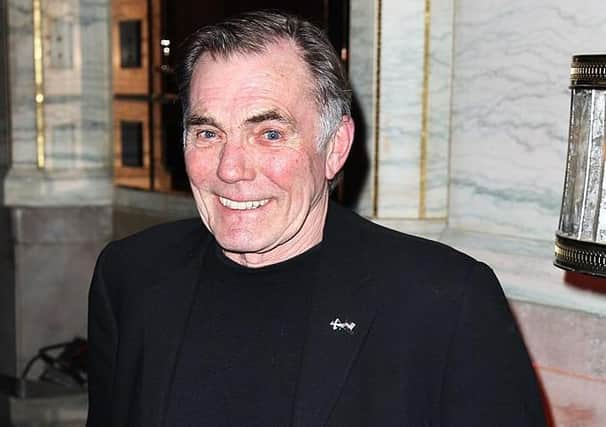Obituary: Maurice Roëves, adopted Scot known to audiences worldwide


Not many actors could boast a resume that included appearances on Rab C Nesbitt and Baywatch, along with a particularly memorable turn as God. Maurice Roëves, who was born in Sunderland, but grew up and lived in Glasgow, had a long and impressive list of credits that included Escape to Victory, with Sylvester Stallone, Michael Caine and Pele, the American sitcom Cheers and the soap EastEnders.
But for many his greatest role was that of Vincent Diver, the aging rock and roller in Tutti Frutti, John Byrne’s 1987 comedy-drama following fictitious band The Majestics on their ill-fated Silver Jubilee tour. It also starred Robbie Coltrane, Emma Thompson and Richard Wilson.
Advertisement
Hide AdAdvertisement
Hide Ad“He was like a Shakespearean tragic figure,” said Roëves of his character. Diver struggles to cope with the ephemeral nature of fame and fortune, his wife discovers he is having an affair, his girlfriend commits suicide, he is knifed in Buckie by a young woman who thinks she is his illegitimate daughter and he ends up dousing himself in vodka and setting himself alight.
With his black leathers and black sideburns, Vincent was more Alvin Stardust than Elvis Presley, but with an undercurrent of incipient violence. It was often the way with Roëves’s characters. And often it was not incipient for long. Roëves also elicited comparisons with Jack Palance and acquired a reputation for roles as hard men and villains. Latterly when he got a script he would remark to his wife Vanessa, “Do I survive to the end of this one?”
But Roëves had not always been the hard man. In the 1960s he had a reputation as a heartthrob, just like Vincent. When he played Lorenzo in The Merchant of Venice, one of his first productions with Glasgow’s Citizens Theatre, young women would hang around the stage door and scream when he came out.
For those whose early adult years coincided with the appearance of the film Trainspotting and Irvine Welsh’s peak of popularity, Roëves’s most memorable role may be his foul-mouthed, cynical God in The Acid House, an adaptation of Welsh’s short stories. One character’s bad day ends when he meets God, who takes a dislike to him and turns him into a fly. Sci-fi fans might more readily associate him with his roles as a Romulan captain in Star Trek: The Next Generation or as a villain in Doctor Who.
Roëves (which was pronounced as two syllables like Noël) did not like the term “Method acting”, and yet he immersed himself in roles, staying up all night, drinking heavily, smoking cannabis and wearing his leathers for 24 hours for one particular scene in Tutti Frutti when his character is confronted by a younger version of himself on a bank of television screens.
Roëves appeared as Colonel Munro in the epic 1992 Hollywood version of The Last of the Mohicans with Daniel Day-Lewis as Hawkeye. Wes Studi, who played Magua, became one of his closest friends and encouraged him to visit Santa Fe, where he lived. Roëves and his wife bought a flat there and for a while split their time between London, Nottingham and Santa Fe. Roëves had dual nationality. More recently, however, he was living between Santa Fe and Edinburgh.
John Maurice Roëves was born in Sunderland in 1937. His father was a manager with the Spillers flour company and the family moved to Glasgow when Roëves was six and his father took charge of the mill in Partick.
“I had to learn Glaswegian fast because I was in Church Street Primary School in Partick during the bad old days and I was fed up having seven bells knocked out of me every day for being a wee Sassenach.”
Advertisement
Hide AdAdvertisement
Hide AdHe did well enough at Hyndland Secondary for his family to hope he might go to university. Instead he took a sales job with Spillers. He had two spells there, interrupted by National Service, during which he completed SAS training. He credited his time in the Army with developing self-discipline and resilience.
Amateur drama led to enrolment at what became the Royal Scottish Academy of Music and Drama and then several years with the Citz. He auditioned for Laurence Olivier at the National Theatre and although Olivier did not think he was right for the part he recommended him to director Joseph Strick for the role of Stephen Dedalus in the 1967 film of James Joyce’s Ulysses.
Other 1960s screen credits include Dr Finlay’s Casebook, Disney’s The Fighting Prince of Donegal, Oh! What a Lovely War and the title character Scobie in a BBC thriller series.
Roëves had a recurring role in the American soap opera Days of Our Lives when he got the offer of a role in Tutti Frutti. “I read it and thought it was terrific, just wonderful. I phoned my agent and said: ‘You’ve got to get me out of this soap because I want to go back and do this series’.”
He continued to work in theatre in the UK and US. In 1976 he played Jock Sinclair in a stage version of Tunes of Glory at Perth Theatre and on tour. It was the role played by Alec Guinness in the film. More recently he starred in a one-man show, Just a Gigolo, about DH Lawrence’s wife’s lover, at the Edinburgh Fringe in 2012.
He was married three times. The first two marriages ended in divorce. He is survived by his third wife Vanessa, a former theatre manager, who uses the professional name Vanessa Rawlings-Jackson – they married in a civil ceremony in Edinburgh’s Traverse Theatre in 2001 – and by Sarah, his daughter from his first marriage to the Scottish actress Jan Wilson, and three stepchildren, Christopher, Jonathan and Alice.
Brian Pendreigh
Comments
Want to join the conversation? Please or to comment on this article.